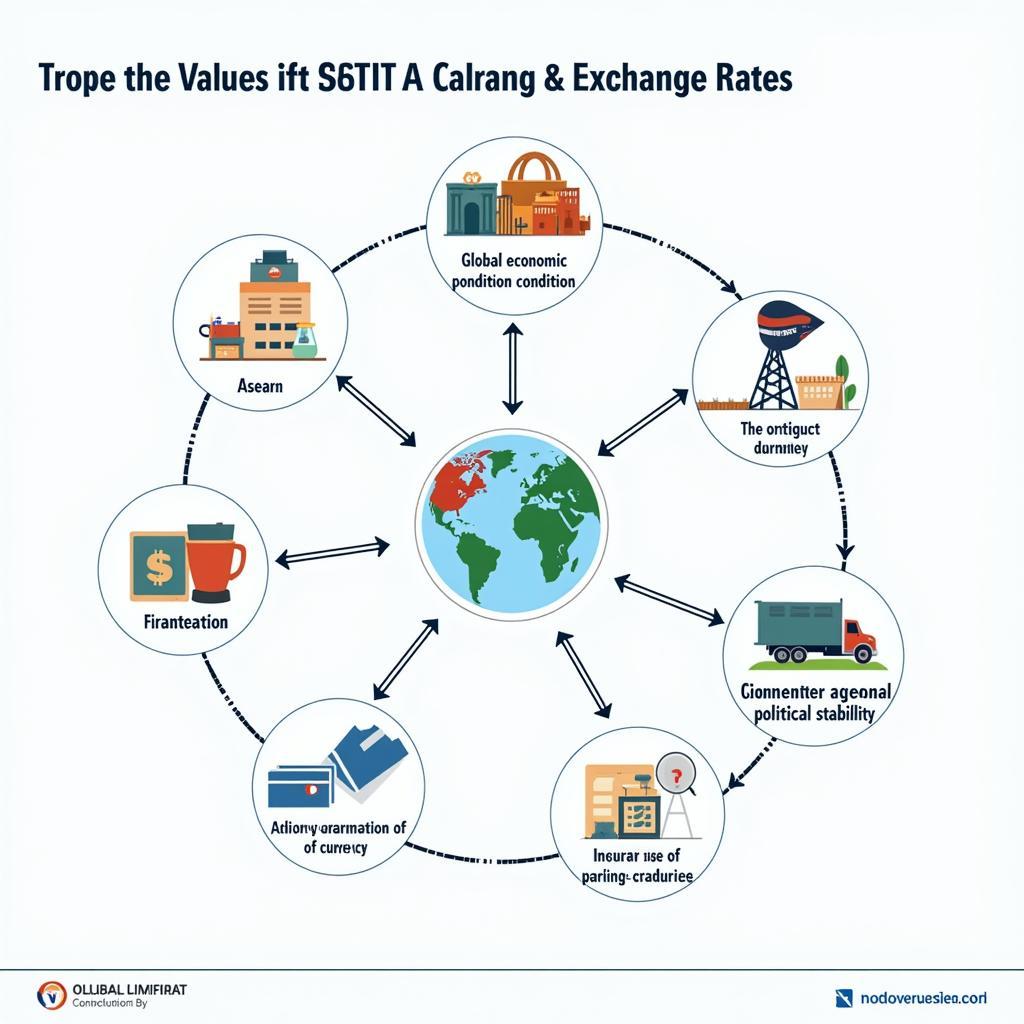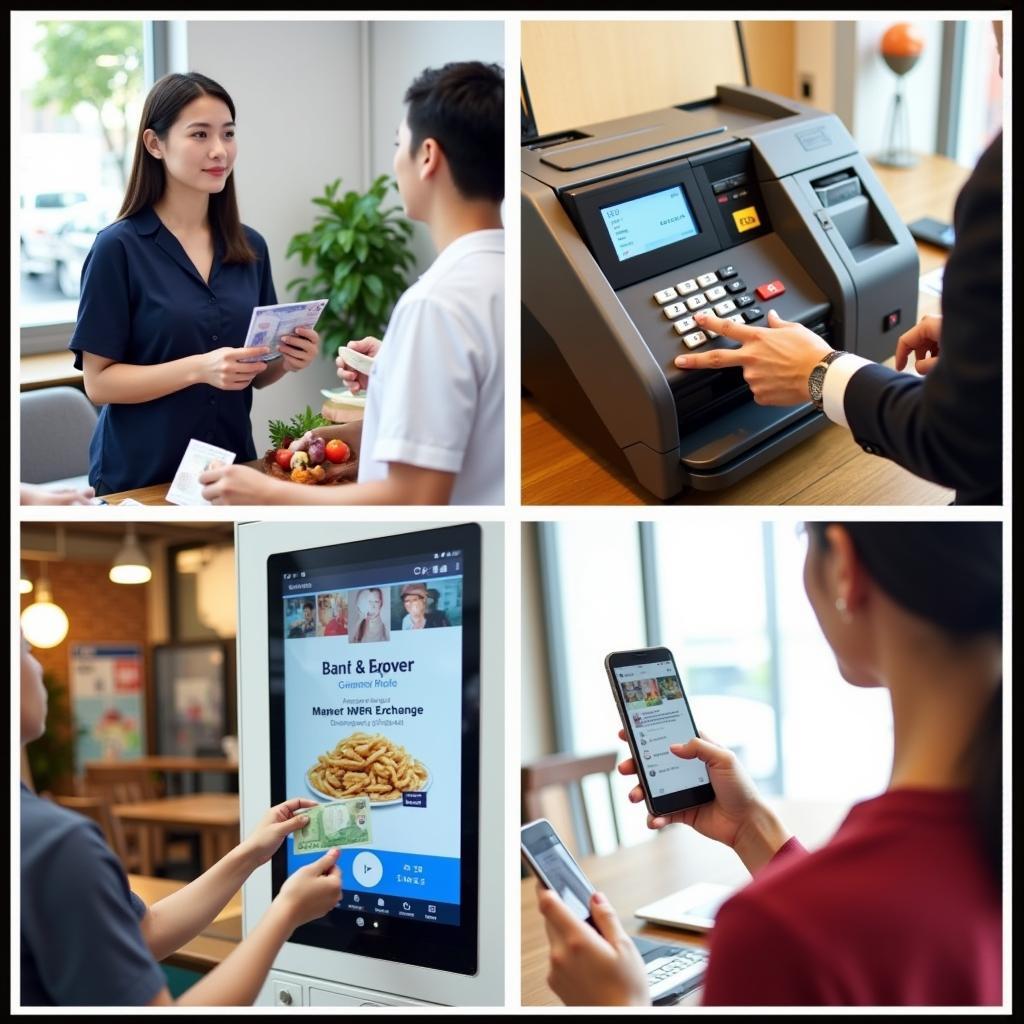The vibrant tapestry of Southeast Asia is woven together by 10 distinct nations, each with its own unique cultural identity and, importantly, its own currency. Understanding the “10 Asean Countries And Their Currencies” is crucial for anyone looking to engage with this dynamic region, whether for business, travel, or simply broadening their knowledge. This article provides a comprehensive overview of each ASEAN member state and its monetary unit.
Exploring the Currencies of the 10 ASEAN Nations
Southeast Asia’s diverse economies are reflected in the variety of currencies used across the region. From the Singapore dollar to the Vietnamese dong, each currency tells a story of its nation’s economic journey. Let’s delve into the specifics of each:
Brunei Darussalam: Brunei Dollar (BND)
Known for its oil wealth, Brunei uses the Brunei dollar, which is pegged to the Singapore dollar. This strong currency reflects the nation’s robust economy.
Cambodia: Riel (KHR) and US Dollar (USD)
Cambodia’s official currency is the riel. However, the US dollar is widely accepted and often preferred, particularly in urban areas. This dual-currency system presents unique challenges and opportunities for the Cambodian economy.
Indonesia: Indonesian Rupiah (IDR)
Indonesia, the largest economy in Southeast Asia, uses the rupiah. With a large and diverse population, Indonesia’s currency market is active and plays a significant role in the regional financial landscape.
Laos: Lao Kip (LAK)
Laos uses the kip, which has historically experienced periods of volatility. The Lao economy is largely agrarian, and this is reflected in the kip’s fluctuations.
Malaysia: Malaysian Ringgit (MYR)
Malaysia’s ringgit is a key currency in the region. Known for its relative stability and strong performance, the ringgit is a reflection of Malaysia’s robust and diversified economy.
Myanmar: Myanmar Kyat (MMK)
Myanmar utilizes the kyat. The kyat has faced challenges in recent years, but ongoing economic reforms are aimed at strengthening and stabilizing the currency.
Philippines: Philippine Peso (PHP)
The Philippines uses the peso, a currency that reflects the country’s growing economy and increasing integration into global markets. The peso’s performance is often tied to remittances from overseas Filipino workers.
Singapore: Singapore Dollar (SGD)
Singapore, a major financial hub, uses the Singapore dollar, one of the strongest and most stable currencies in Asia. Its strength reflects Singapore’s highly developed economy and its role as a global trading center.
Thailand: Thai Baht (THB)
Thailand uses the baht, a relatively stable currency that is often considered a safe haven within the region. The baht is closely tied to the tourism sector, a crucial component of the Thai economy.
Vietnam: Vietnamese Dong (VND)
Vietnam, a rapidly developing economy, uses the dong. While the dong has historically faced inflationary pressures, the Vietnamese government has implemented measures to enhance its stability.
Understanding ASEAN Currency Fluctuations
Factors such as global economic conditions, political stability, and commodity prices can significantly influence ASEAN currencies. These fluctuations can impact trade, investment, and tourism within the region.
10 negara asean dan mata uangnya provides further information about ASEAN currencies.
What influences ASEAN currency exchange rates?
Several interconnected factors can influence these rates, including economic growth, interest rate differentials, political stability, and global market sentiment.
 Factors Influencing ASEAN Exchange Rates
Factors Influencing ASEAN Exchange Rates
Understanding apa itu kurs valuta asing is important for anyone doing business in the ASEAN region.
The Importance of Currency Exchange in ASEAN
Whether you are a business traveler, an investor, or a tourist, understanding currency exchange is crucial in ASEAN. Knowing the current exchange rates and the best ways to exchange currency can help you manage your finances effectively.
akaun mata wang asing can provide valuable assistance in navigating currency exchange within ASEAN.
What are the common methods for exchanging currency in ASEAN?
Common methods include banks, money changers, and online platforms. It’s important to compare rates and fees to get the best deal.
 Currency Exchange Methods in ASEAN
Currency Exchange Methods in ASEAN
3 sistem penetapan kurs valuta asing explains the different systems for determining foreign exchange rates. You may also want to be mindful of any ase spending limimt when travelling or doing business in the region.
Conclusion
Understanding the “10 ASEAN countries and their currencies” is essential for navigating this dynamic region. Each nation’s currency reflects its economic journey, and appreciating these differences enhances understanding of ASEAN’s diverse landscape.
FAQ
- What is the strongest currency in ASEAN? The Singapore dollar is generally considered the strongest.
- Which ASEAN country uses the US dollar as legal tender? Cambodia widely uses the US dollar alongside its official currency, the riel.
- Where can I find the most up-to-date exchange rates for ASEAN currencies? Reputable financial websites and currency converter apps provide real-time information.
- What factors influence ASEAN currency fluctuations? Global economic conditions, political events, and commodity prices are key factors.
- Are there restrictions on exchanging currency in ASEAN countries? While generally straightforward, it’s always best to check specific regulations for each country.
- What are the best ways to exchange currency in ASEAN? Banks, licensed money changers, and reputable online platforms are common options.
- Is it better to exchange currency before or after arriving in ASEAN? This depends on various factors, including your home currency and the specific ASEAN country you are visiting. Researching current rates and exchange options can help you make an informed decision.
Need assistance? Contact us 24/7: Phone: 0369020373, Email: aseanmediadirectory@gmail.com, or visit us at: Thon Ngoc Lien, Hiep Hoa, Bac Giang, Vietnam.
